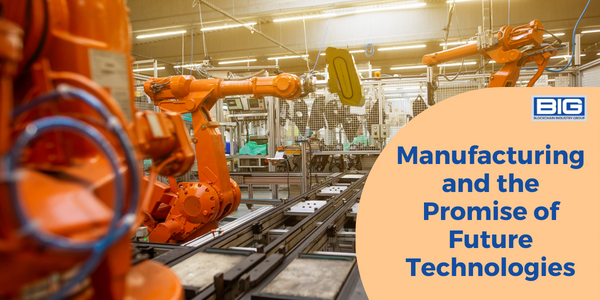
The adoption of future technologies has the potential to drive significant progress and change in the manufacturing industry, creating new opportunities and improving the efficiency and effectiveness of operations. These technologies could enable the development of highly personalized and customized products, as well as optimize operations and supply chains through data analysis and advanced analytics. The use of advanced materials and 3D printing could also drive significant change, enabling the production of lighter, more durable, and customized products. As these technologies continue to advance and evolve, they have the potential to drive even more transformative change in the industry, driving progress towards a better future.
Automation and robotics
The adoption of automation and robotics technology could significantly improve the efficiency and productivity of the manufacturing industry, leading to the development of new business models and the creation of new opportunities for those with the skills to design, build, and operate these systems.
For example, the use of robotics and automation in manufacturing could lead to the development of highly efficient and flexible production lines that are able to quickly and accurately produce a wide range of products. This could enable manufacturers to produce products more quickly and at a lower cost, while also improving the consistency and quality of their products. Additionally, the use of robotics and automation could enable the production of products that are too complex or hazardous for humans to produce, opening up new opportunities for manufacturers.
Advanced materials
The development of new materials that are stronger, lighter, or more durable could significantly improve the performance and functionality of products and drive significant change in the manufacturing industry. These advanced materials could enable the development of new products and significantly improve upon existing ones, creating new opportunities for manufacturers.
For example, the use of advanced materials such as carbon fiber, graphene, and advanced polymers could enable the production of lighter and more efficient products, such as airplanes and cars, as well as products with new or improved functionalities, such as sensors and medical devices. The adoption of these materials could also enable the production of products that are more durable and resistant to wear and tear, improving their lifespan and reducing the need for repairs and replacements.
Personalization and customization
The adoption of technologies such as artificial intelligence and machine learning could enable the development of highly personalized and customized products, driving significant change in the manufacturing industry. As consumers increasingly expect tailored experiences that meet their specific needs and preferences, the ability to produce customized products could become a key differentiator for manufacturers.
For example, the use of artificial intelligence and machine learning could enable manufacturers to develop products that are tailored to the specific needs and preferences of individual customers, such as custom-fit clothing or personalized medical devices. These technologies could also enable manufacturers to analyze customer data and trends to identify new opportunities for customization, helping them to stay ahead of the curve and meet the evolving needs of their customers.
Data analysis and insights
The proliferation of data and the development of advanced analytics technologies could enable the manufacturing industry to gain new insights into customer behavior and trends, as well as optimize operations and supply chains. This could drive significant change by enabling manufacturers to make more informed decisions and improve the efficiency and effectiveness of their operations.
For example, the use of data analysis and advanced analytics could enable manufacturers to identify patterns and trends in customer data, helping them to understand the needs and preferences of their customers and develop products and services that better meet those needs. These technologies could also enable manufacturers to optimize their operations and supply chains, reducing waste and increasing efficiency, as well as identify new opportunities for innovation and growth.
20 Artificial Intelligence Use Cases
—
20 Autonomous Vehicle Use Cases
—
20 Internet of Things (IoT) Use Cases
3D printing
The adoption of 3D printing technology could significantly change the way that products are designed, produced, and distributed by enabling the production of customized and complex products on-demand. This could drive significant change in the manufacturing industry by enabling the production of low-volume, customized products and reducing the need for large-scale production facilities.
For example, the use of 3D printing could enable manufacturers to produce customized products in small quantities, allowing them to respond more quickly to changing customer demand and reduce the risk of producing products that do not sell. 3D printing could also enable the production of complex and intricate products that would be difficult or impossible to produce using traditional manufacturing methods, opening up new opportunities for manufacturers.



